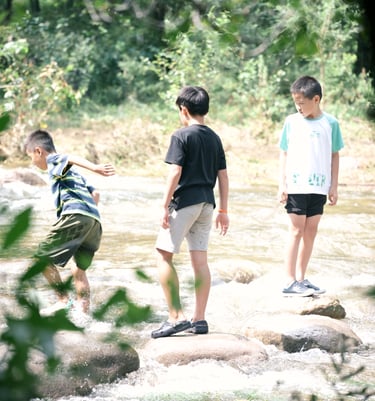I realised my hypocrisy when judging other parents.
A family hike through Hou He becomes a vivid tapestry of mud, water, and emotional weather. From Gek’s early frustration to Dik’s quiet courage, and a surprise bee swarm that tests everyone’s composure, this post explores the messy beauty of parenting in motion. As we cross rivers and navigate discomfort, we uncover what resilience looks like—not just in our children, but in ourselves.
9/1/20253 min read


🥾 River Crossing and the Dance of Discomfort
Yesterday’s hike was more than just a physical journey—it was a layered experience of grit, grace, and growth. Gek, Dik, Mum, Hunter, and I set out under a sky that had recently shed its weight in rain. The river we crossed, knee-deep for me and nearly engulfing for Hunter—our spirited 8kg Pomeranian-Husky mix—was a first for us as a family. The water, though no longer swollen to waist height, still carried the memory of the storm, rushing with a quiet urgency.
Gek struggled early on. Months without trekking had dulled his stamina, and the sun—relentless and unforgiving—seemed to sap his will. He voiced his frustration openly, questioning why we had come. Yet, once we reached the river, his mood shifted. The water became his playground, a balm for his aching legs and overheated spirit. He cooled himself with abandon, splashing and soaking, much to Mum’s dismay. She had braced herself for the mess, but our muddy shoes tested her patience. Still, she didn’t flare up—just sighed, knowing that on this terrain, cleanliness was a fleeting illusion.
Dik, smaller and more cautious, hesitated at the river’s edge. The current was swift, and I could see the calculation in his eyes: his size versus the force of nature. He clung to Mum's hand, his fear palpable but not paralyzing. He crossed, step by careful step, and I felt a quiet pride in his resolve and cautiousness.
Around us, other trekkers reacted to the crossing with a chorus of “ewws” and “yikes.” The water, though clear, gave way to mud and grit that clung to skin and settled into sandals. It was a sensory clash—cool purity followed by earthy intrusion. I wish I could better describe the way the river seemed to laugh at our discomfort, offering beauty and mess in equal measure.
🐝 The Descent and the Unexpected Swarm
After the first crossing, the trail narrowed and dipped into a muddy slope, slick and treacherous. Everyone had swapped trekking shoes for sandals, prioritizing river crossings over grip. Progress was slow, deliberate, almost meditative.
Then came the boy. Early teens, restless, poking the ground with his trekking poles as if searching for something to blame for his mood. His face was unreadable—part impatience, part unease. Suddenly, he screamed: “Bees! Bees!” Panic rippled through the group. He flailed, calling for his mother, and in the chaos, many of us were stung.
Mum was among them. She didn’t scream. She didn’t run. She stayed calm, even as I silently wished she’d retreat from the scene. She stood there waiting for Dik who has not crossed the location of the hive.
The boy’s cries continued, and his mother rushed forward to look at him. There was no severe allergic reaction, just pain—and perhaps embarrassment. I tried not to judge, and of course I failed. I blamed him for his itchy hands for stirring up the bees, I blamed him for the couple of bee stings on Dik's calf and a dozen or two stings on Mum's legs and hands. Served him right.
🧠 Reflections on Parenting and Emotional Weather
After continuing the hike for another hour, the boy was still whining and even his mother become frustrated. The incident stirred something in me. As parents, we walk a tightrope between protection and preparation. I judged her. Could she have been spoiling her son, that led to this scene?
At the same time, I was reminded of my gentleness with Gek earlier, extremely eager to encourage him without allowing time for him to battle his own emotions? His complaints during the ascent—his anger at the heat and the decision to hike—echoed in my mind. Was that just fatigue talking, or a deeper pattern of resistance when discomfort arises?
If my parenting had failed, why did I see resilience in Dik. Dik, though stung, didn’t spiral. He asked questions, sought comfort, and moved on. To be honest, Gek also bounced back, found joy in the river, and didn’t let the early frustration define the day.
Parenting, I’m learning, is similar from family to family. Maybe we should not be happy when we are doing what is seemingly right, and not sad when we are doing what is seemingly wrong, it is just life, cycling from phase to phase. We will never be ALWAYS right, nor ALWAYS wrong.